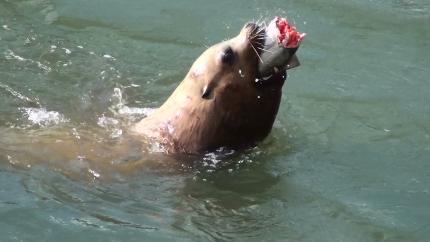ARCHIVED NEWS RELEASE
This document is provided for archival purposes only. Archived documents
do not reflect current WDFW regulations or policy and may contain factual
inaccuracies.
News release Aug. 17, 2020
Ben Anderson, 360-902-0045

OLYMPIA – The National Marine Fisheries Service (NMFS) on Friday approved an application allowing the Washington Department of Fish and Wildlife (WDFW) and partners to expand a program to lethally remove sea lions preying on threatened and endangered salmon and steelhead in the Columbia River basin.
WDFW, along with Oregon, Idaho, and six regional tribes, submitted the application in June 2019 after Congress passed an amendment to the Marine Mammal Protection Act (MMPA) in December 2018 allowing wildlife managers greater flexibility in determining when predatory sea lions may be lethally removed in areas where salmon and steelhead listed as threatened or endangered under the Endangered Species Act (ESA) might be present.
The new permit allows removals to take place on a portion of the Columbia River mainstem between the Interstate-205 bridge and McNary Dam, as well as any Columbia River tributary that includes spawning habitat of ESA-listed salmon or steelhead.
Sea lions congregate along the river in increasing numbers every year, including at bottlenecks like Bonneville Dam, where they consume thousands of salmon and steelhead annually.
The expanded removals could begin as early as this fall, said Kessina Lee, Southwest region director with WDFW.
“Sea lions traveling up the Columbia have had a detrimental impact on already-troubled salmon and steelhead populations, and this permit represents a significant step forward in our ability to give these fish species an immediate boost to increase survival while we continue working on long-term solutions,” Lee said.
The Washington Legislature this spring approved additional funding to expand these operations to protect salmon and steelhead and provide benefit to the endangered Southern Resident Killer Whales, which rely on salmon as a key part of their diet.
The additional funding was contingent on approval of the permit by NMFS.
“We don’t expect this program to solve the problem on its own,” Lee said, “but it represents one more tool in the toolbox as we continue working to also restore habitat, manage hatcheries and fish harvest, and develop hydropower policy.”
Though managers have carried out lethal removals of California sea lions on the Columbia River for years, the new permit represents the first time Steller sea lions may also be removed.
Partners are unlikely to remove the total number of animals allowed for by the permit, which includes as many as 176 Steller sea lions and 540 California sea lions over a five-year period.
Both California and Steller sea lions have made strong recoveries in the years since passage of the MMPA, with California sea lions now numbering more than 250,000, along with more than 70,000 animals in the eastern population of Steller sea lions.
Other entities who submitted the application with WDFW include the Oregon Department of Fish and Wildlife, the Idaho Department of Fish and Game, the Nez Perce Tribe, the Confederated Tribes of the Umatilla Indian Reservation (CTUIR), the Confederated Tribes of the Warm Springs Reservation of Oregon (CTWSR), The Confederated Tribes and Bands of the Yakama Nation, and the 3.6.D Committee, which includes ODFW, CTUIR, CTWSR, the Confederated Tribes of the Grand Ronde Community, and the Confederated Tribes of the Siletz Indians of Oregon.
The Washington Department of Fish and Wildlife is the state agency tasked with preserving, protecting, and perpetuating fish, wildlife, and ecosystems, while providing sustainable fishing, hunting, and other recreation opportunities.